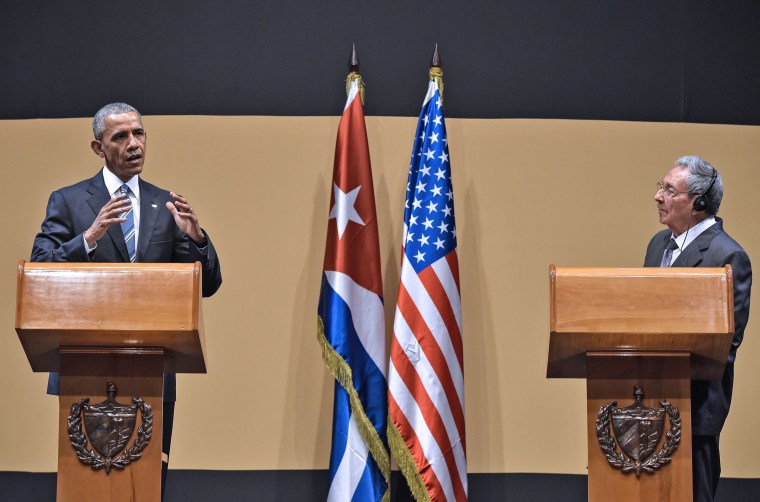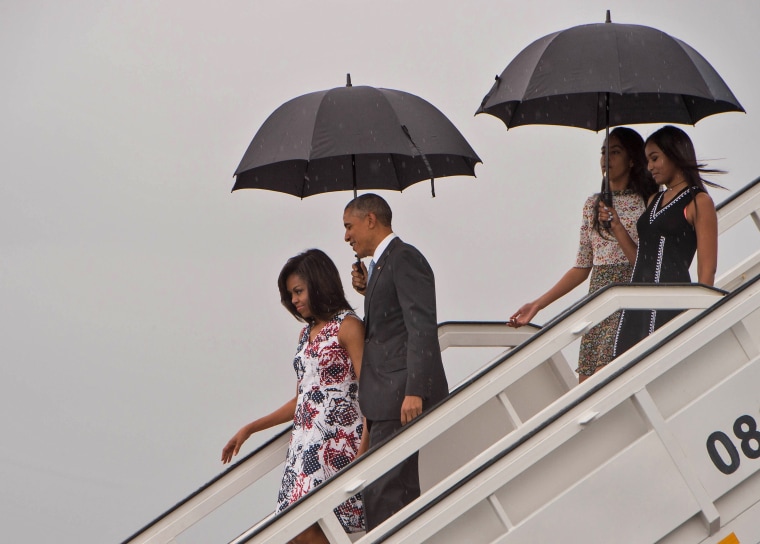HAVANA, Cuba -- On a historic day in Havana, Cubans lined the streets hoping to catch a glimpse of the American president between his stops and his meeting with Cuban president Raúl Castro.
“I came to welcome Obama, like I would any other visiting president and for him to see that the Cuban people admire him for his bravery,” Amado Mejias told NBC News as she waited near the Havana Cathedral.
“I personally think that there will be change. What he needs to do is use his executive power,” he added.
RELATED: President Obama Arrives in Cuba for Historic Visit
Orlando Garcia, who waited for Obama near the José Martí Memorial, hoped that Obama’s visit will ease the travel restrictions of Cubans going to the U.S. “We’ll see if Cuban families can visit our children, as in my case, and that they do not deny me permission to visit them,” he said tearfully, “The U.S. embassy does not approve all the people that ask to visit because they think we’ll stay there.”
President Obama and Cuban President Raúl Castro gave a joint press conference Monday, where President Obama said that he remains concerned about the island's record on human rights but that the two nations have enough in common to negotiate the normalization of relations.
RELATED: Despite Detentions, Cuban Dissidents Hope to Meet at Obama Meeting
"When we share our deepest beliefs on an attitude of mutual respect, then we can both learn and make the lives of our people better," Obama said, “What we did for 50 years did not serve our interests or the interests of the Cuban people.”
He added that the United States respects Cuba's sovereignty, saying that “the future of Cuba will be decided by Cubans and not by anyone else.”
Castro said Cuba has remained committed to normalizing relations but added that it would only be possible if Congress ends a decades-old embargo.
The blockade, Castro said, is "the most outstanding obstacle to our economic development" and insisted that that Cuba "defended human rights."

“Give me a list of political prisoners and I will release them,” Castro added.
Back in the U.S., there have been varied opinions on Obama's trip, particularly among the Cuban-American community.
Republican National Committee’s Director of Hispanic Media Ruth Guerra issued a statement criticizing the visit, saying: “By visiting Cuba before seeing any progress on human rights or freedom for the Cuban people, he legitimizes an oppressive regime and abandons the people he says this policy shift is all about.”
Guerra added that the trip was not meant to relieve Cuban’s issues but that it was about President Obama’s “legacy.” The GOP also issued a statement quoting Democratic Cuban-American New Jersey Senator Bob Menendez’s speech on the president’s trip. “We learn that, despite the Obama Administration's engagement with the Castro dictatorship and increased travel to the island, repression on the island is exponentially rising,” he said.
But there is support for Obama's visit among other members of Congress and the business community.

Xavier Becerra, member of the House of Representatives and Chairman of the House Democratic Caucus, accompanied Obama to Cuba and has been very positive about the trip, "There’s interest in seeing more dialogue because there’s a belief that more interaction with the U.S. will lead to more openness with Cuba and you get the sense from talking with Cubans that they want to create stronger ties,” he said.
Julián Castro, the Secretary of Housing and Urban Development, tweeted his support of the trip, writing “Historic visit to Cuba by @POTUS promises a new, constructive era of American-Cuban relations.”
